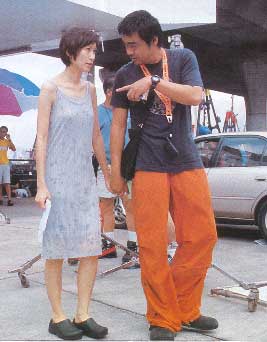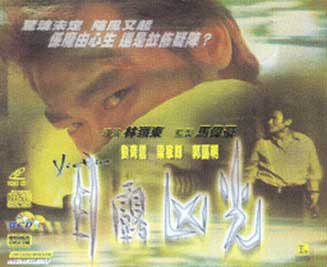

His latest film, The Victim, is a difficult movie to categorize. It has much of the same feel as both Full Alert and The Suspect in its up-tempo pacing and has the same plot element of a cop after a suspect – perhaps innocent, perhaps not. In a seeming bow to the current horror film craze in HK though, Lam imbues this standard cops and crooks plot with some supernatural elements that have the potential of taking this film into entirely new directions for Lam.
His mix of a police procedural film with touches of the supernatural seems initially like a winning combination – but in the end you wonder why he bothered with the supernatural element or even more so from my perspective – why he didn't go much further with it. Its almost like he wanted to show how easy it was to do a “horror” film, but then returned to what he really prefers – a tense suspense cop film. But by then the audience expectations had been built up too much and the ending comes as a letdown.
The film begins with a van racing out of a parking garage and running down and killing one of the attendants. Tony Leung Ka-Fai is put in charge of the investigation and he gets a hold of the garage surveillance video that shows Lau Ching-Wan being kidnapped and hustled into the van. Tony talks to Lau’s live in girlfriend (Amy Kwok – Lau’s real life wife), but she initially claims to have no idea who might want to kidnap him. Lau has been unemployed for six months and has no money. At times Lam seems to be indicting the entire HK bubble economy that left so many careers and hopes dashed. Are these people the real "victims" in this film?
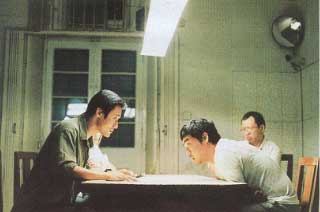
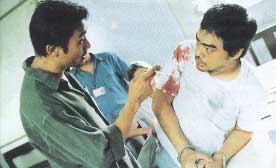
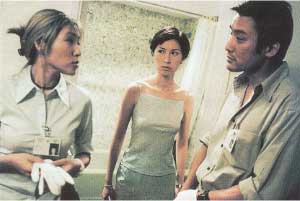
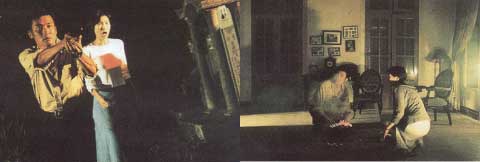
In an interesting posting made to the Mobius Board, Grady Hendrix reports that Lam and the producer Joe Ma argued over the amount of supernatural elements that should be in the film - with Lam wanting much less - and that there are two separate endings - one with and one without the peculiar oddity that occurs at the end. I can't say more without giving away too much - but I saw the version with it. But certainly this tug of war between the director and the producer would explain much of the reason behind the lack of commitment from Lam one way or another towards including these supernatural elements.
My rating for this film: 7.5
VICTIM is one of those movies that strike me as only something Hong Kong film makers would come up with: Not because it’s particularly outrageous in tone or visual treats; but, rather, because it is such a (successful) mix of genres. In parts a creepy supernatural horror, engrossing crime drama and suspenseful thriller, this dark 1999 Ringo Lam helmed effort also comes across as an angst-filled cry of frustration on behalf of the Hong Kong inhabitants who lost their jobs and were otherwise negatively affected by the extended East Asian economic crisis.
In a society like the HKSAR’s that is noted for having a great many workaholic individuals (such as Tony Leung Kar Fai’s Pit character, who can be so intent on cracking a case as to forget his own birthday), it could be argued that retrenchment might be a particularly mentally unstabling occurrence for many people. This may be particularly so when the person concerned -- someone like Lau Ching Wan’s Manson Ma -- is unable to find another position after six months, becomes economically reliant on his significant other, gets labeled a loser by others, and consequently starts thinking that all his book learning and previous professional efforts have been in vain. And though they may have thought differently, it most certainly doesn’t help computer expert Manson and his live-in girlfriend of ten years (the character portrayed by Amy Kwok has the same first name as the actress) to have resorted to borrowing more than HK$1 million from the kind of loan-sharks that don’t look like they would hesitate too much to carry out violent acts on those clients of theirs who prove to be less than ideal ones.
At the same time, Ringo Lam -- as befitting his being someone who, from interviews, descriptions of him by others (like Chow Yun-Fat and his wife, Jasmine) and those movies he has directed that I’ve viewed, can come across as being an archetypal Mr. Unhappy -- shows in VICTIM that life is not necessarily peachy keen either for those who have not (yet) been retrenched. For example, detective Pit spends a significant portion of this film thinking that his wife is two-timing him (N.B. Judging from Manson and a hotel owner who killed his wife and son before committing suicide having had similar suspicions about the main women in their life, this is the fear and concern of more than a few male Hong Kongers). Then there’s Pit’s more easy-going partner (Bee is understatedly played by Wayne Lai) being shown worrying quite a bit about -- as well as studying for -- an upcoming test that he needs to pass in order to achieve a higher rank in the police force (one that would come with an increased salary that will finally allow the already married man and parent to buy -- rather than just rent -- living space for himself and his family).
Lest (some) people think that I am reading too much into what may be primarily perceived as having been made with nothing more in mind than eliciting scary chills and action thrills (and did deliver on that score), here’s pointing out that Ringo Lam is on record as stating that: One of the themes in VICTIM is the modern family; “[w]hen I was making the film, my state of mind was really up and down”; and “[e]ach time I work on a film,...I always like to put in something to worthwhile, to recall for later if you like. Of course, these personal things only make up a very minor part in the narrative. But I would always put something into each film so that it becomes richer in my mind when I look at these films later” (See Pp. 55-56 of the HKIFF’s “Hong Kong Panorama 1999-2000”).
Additionally, lest it not be already apparent: VICTIM is one of those movies that I got more out of viewing than Brian. It probably helped that I -- who did view the same version of the work as him -- feel that the amount of supernatural elements was exactly that which was called for by the story (to do such as draw parallels between three different families). I also found myself more than willing to forgive some of this emotionally impacting film’s weaker and/or less credible moments, in part because it was bolstered throughout by a uniformly fine level of acting from virtually everyone who had a speaking part (This includes character actors like Hui Siu Hung, Emily Kwan, Joe Lee and Suki Kwan). In any case, after viewing this as well as others of Ringo Lam’s top-notch Hong Kong offerings (like “Full Alert” and “School on Fire”), I have to say that I really hope that he -- who has a co-scriptwriting credit for this work along with producer Joe Ma and Ho Man-Lung -- stays (productive) in his home territory and desists from wasting any more time plus effort on trying to break into Hollywood by way of directing straight-to-video flicks that star untalented actors like Jean Claude van Damme.
My rating for this film: 8.5
